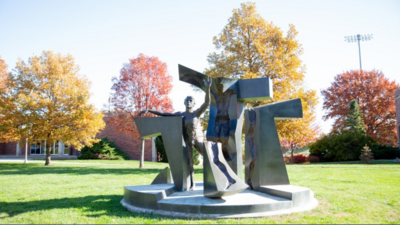The versatility of a degree in psychology

Psychology is a field of study that, most often, tries to answer the many “why’s” of human behavior. If you ever find yourself curious about these “why’s,” then a degree in psychology may be where you find your calling. At Concordia University Nebraska, the psychology program opens students up to pursuing a wide variety of real-world careers that are virtually limitless in scope.
Psychology studies one of the most basic aspects of life: human behavior. It follows, then, that workforce roles for those who are skilled at understanding and communicating the nuances of human behavior abound! People with a strong basis in psychology can be found working in schools, private clinics, corrections centers, and research institutions. Despite popular opinion, not all psychology majors end up as mental health counselors. While this is a fantastic and fulfilling career option, it is not the only one with a degree as versatile as one in psychology.
In Concordia’s psychology program, you will have the opportunity to take classes in nearly every domain of the study, covering topics like personality theory, social psychology, abnormal psychology, and counseling. You’ll learn how to conduct psychological research, how to communicate effectively in small groups, and how to talk to people in their darkest times. This program will provide you with the skills that you will need to be successful in any career path you decide to follow.
So where do students with bachelor’s degrees in psychology end up? According to the American Psychological Association, in 2019, about 1.5 million individuals in the workforce held a bachelor’s degree in psychology as their highest degree. Case workers, probation officers, psychiatric technicians, and human resource specialists commonly hold bachelor’s degrees in psychology. These positions range in salary from $35,000 up to $65,000 per year.
According to the Georgetown University Center on Education and the Workforce, about 45% of undergraduate psychology majors receive a graduate degree, compared to about 35.1% of all college graduates. Salaries increase with experience and specialization, but individuals who receive a graduate degree in psychology can expect to earn from $40,000 to more than $100,000. Psychology can even be an undergraduate degree that leads into the medical field, where psychiatrists (who both provide psychotherapy and can prescribe medication) can earn well over $200,000.
The American Psychological Association estimates that 500,000 individuals held master’s degrees and 200,000 held doctoral degrees in psychology in 2019. These workers were more likely to hold positions in counseling, postsecondary education, or clinical psychology. However, a bachelor’s degree in psychology can be a starting point for graduate degrees in numerous other fields, such as forensics, neuroscience, and education – Concordia, for example, offers an online master’s program in school counseling!
Even if you do not major in psychology, a minor or a few classes in the subject can provide a better understanding of human behavior in any field. Whether you specialize in the natural sciences, theology, communications, marketing and sales, or education, a basic understanding of psychology can improve how you interact with others and understand their behavior. At Concordia, the psychology program can provide students with a major that serves as the basis for many pre-professional programs, including pre-law, pre-seminary, and pre-social work.
If you gain any insight from this article, let it be that a psychology degree is not a one-size-fits-all path to any one career. Instead, it is a uniquely applicable area of study that provides students with an understanding of those “why’s” of human behavior, which are essential to living in this world. A degree in such a versatile field is a gateway to lifelong learning, further research, and a career that serves others in great ways. If you yearn to know more about why the societies of the world operate in the way that they do, the only question left to ask is: why not a degree in psychology?
Are you interested in studying psychology at Concordia? Learn more here.
Related Stories


